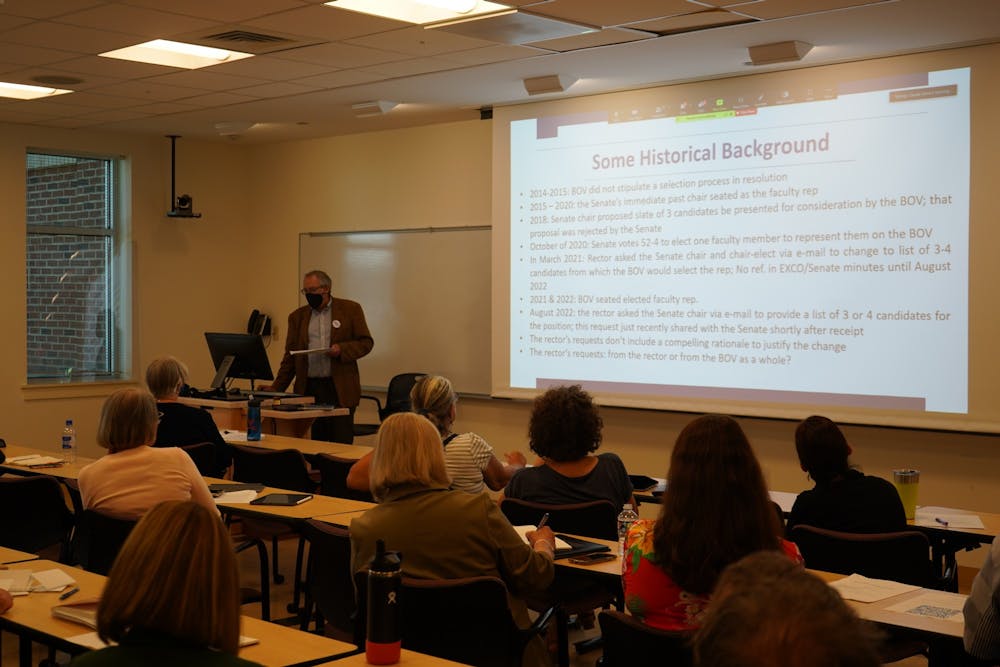The Faculty Senate held an informational meeting Wednesday to educate members on five proposed amendments, which the Senate will vote on at its next meeting. The fifth and final amendment, which determines the way Senators elect their representative to the Board of Visitors, was debated among attendees.
Currently, a single individual from the Senate is elected to be the faculty representative to the Board. Susan Kirk, senate chair and associate professor of medicine, is the current faculty representative to the Board.
While other Board members are appointed by the governor, the Faculty Senate is permitted to elect one non-voting representative to sit on the Board. Faculty Senators themselves are elected by the University school they represent.
If the new amendment is adopted in October, however, the Senate will instead elect a slate of three candidates, from which the Board selects one individual from the group to serve as representative.
The change was proposed after the Board told the Senate that it would not allow any senatorial representation if the Senate did not offer multiple candidate options for their consideration — giving the Board more control over the Faculty Senate’s already limited role in the Board selection process. Regardless of the election process, the Senate representative to the Board will remain a non-voting member.
Four guest speakers were invited to comment on the amendment and faculty representation on the Board — Former Rector Rusty Conner, University Counsel Cliff Iler, Assoc. Education Prof. Walter Heinecke and retired Education Prof. Joe Garofalo.
Heinecke — who also serves as the president of the University’s chapter of the American Association of University Professors — said he is against the bylaw change because he considers it rushed and unclear. Heinecke said only about three or four public universities in Virginia currently practice slated appointments.
“From our perspective, faculty representative selection is an essential component of academic shared governance,” Heinecke said. “Election of a representative means one individual selected by a majority vote. Selecting a slated candidate corresponds to a nomination, not an election.”
Iler, however, said Senate members interpreted the legal wording of the current bylaw differently from the Board. The debate hinges on the bylaw’s wording, which says the representative “shall be chosen from the individuals.” Some senators interpret the bylaw to mean that the faculty representative must be directly elected by the Senate, while others feel that electing a slate of candidates is sufficient.
“I can tell you that the Board’s interpretation of the statute … in my opinion is consistent with the law,” Iler said.
The other four proposed bylaw amendments were uncontested by meeting attendees. The first amendment changes the minimum number of Senators per school from one to two. The second allows those who are serving as chairs to maintain their positions as senators after their chairship is up, if they so desire.
The third amendment allows for general proxies in addition to specific proxies. General proxies allow senators to give authority to another senator to vote on his or her behalf — regardless of amendments and predetermined motions — whereas special proxies are only for a previously stated proposal. The fourth adjusts the dates of Senate terms by one month. Senate terms would begin July 1 rather than June 1, because of difficulties doing business during the beginning of the existing term.
The meeting agenda allotted 30 minutes to University President Jim Ryan and Provost Ian Baucom, who discussed University priorities for the 2022-23 school year. Among these were the Emmet-Ivy Development, a construction project meant to provide building space to the School of Data Science, the Karsh Institute of Democracy and a performing arts center.
Ryan and Baucom also discussed the development of U.Va. NOVA — a University campus based in Arlington County — and the launch of a pilot program for the Cavalier Opportunity Fund, which would cover costs of college attendance that are not always covered by traditional financial aid.
The next hybrid Faculty Senate meeting will be held Oct. 25 from 1 to 3 p.m. in the Claude Moore Nursing Education Room 1120 and on Zoom.







